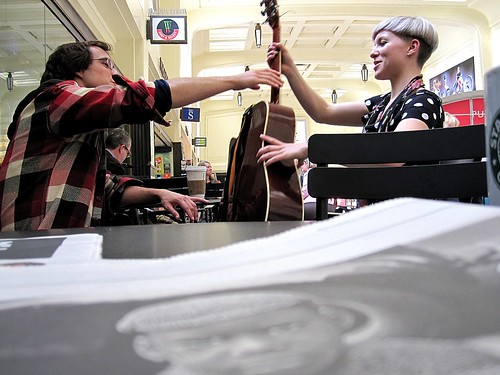Hi!
Capitalism vs Patriotism
This is an excerpt from the transcript of a fascinating transcript of a CNN discussion between CNN’s Candy Crowley and Jim Hoffa, boss of the Teamsters union.
HOFFA: I think businesses are sitting on money. Look at Apple. They have $76 billion in their checking account. And they’re spending it.
CROWLEY: Which they are allowed to have.
HOFFA: But they are not doing anything with it. And instead of investing here, everything they do is in China or is in Asia somewhere. And the answer, look at Honda. Honda is building $1 billion plant, and they want to build it in Mexico. This is on the drawing board right now.
CROWLEY: It’s cheaper there.
HOFFA: Why isn’t it — well, we know that. But don’t they have an obligation to America to build it in America, to put people to work here instead of in Mexico? That’s what I believe.
You know, this is really — I think the president should challenge the patriotism of these American corporations that are sitting on the sidelines saying, why do we have high unemployment but I am not going to hire anybody? You know, they have an obligation just like the federal government, just like Obama. We have all got to get into the game. And I don’t see that happening. So the trillions and billions of dollars that they have on the sidelines, they have money, Pfizer and General Electric, they have trillions of dollars overseas, let’s start repatriating that money. Let’s start a program to get America going again.
The problem in America is not that we don't have enough money. We have got more money than any other country in the world. The problem is American businesses are not spending it and not getting it in the game. That’s how we are going to get America going again.
CROWLEY: I’m hearing tweets across the universe here because — I want to go back. Are you questioning the patriotism of Apple for sitting on money rather than hiring?
HOFFA: Yes, I am.
CROWLEY: Are you?
HOFFA: Yes, I am. What is it with a company that makes — and they sell most of their products here in the United States. I mean, they’re the biggest — Apple, you have got Apple Stores everywhere else.
They have been sitting on that kind of money and every time they do something, they do it in China, they do it somewhere else. There’s something wrong with that. Don’t they have an obligation?
CROWLEY: They would tell you that the high price of labor and the high cost of health care and the high cost of environmental — you know, drove them out of the country.
HOFFA: I don’t believe that at all. You know, we have companies here that make a lot of money like UPS. We have a number of great companies here that are functioning here that are union, Sikorsky, and they are doing very, very well.
You can do it here. But the answer is, you have to have the incentive. And so many companies like Mr. Coffee and all of these other companies that have closed and moved to Mexico, they are wrong. They are unpatriotic.
We have got to turn this around and say, hey, we are an American company, we owe an obligation to America, let’s put America back to work.
Funny thing: the only area when capitalism doesn’t conflict with patriotism is the so-called ‘defence’ industry.
Has the revolt begun against Apple’s iPad app fees?
This morning’s Observer column.
How things change. It seems only a few months ago that magazine and newspaper publishers, maddened by the fact that the Big Bad Web enabled readers to access their content for free (and sceptical about the effectiveness of paywalls), decided that Apple’s iPad was just the ticket. Henceforth, they would publish their stuff not as web pages but as iPad apps. Not only did this offer them a shiny device that would display their wares in glorious living colour, but it would also force cheapskates and freeloaders to pay real money for the privilege of accessing them. This was possible because nothing happens on the iPad without going through Apple’s iTunes store, and Steve Jobs knows your credit card details. Thus the “free riding” that was commonplace on the web would become a thing of the past.
Accordingly, publishers fell like ravening wolves on the iPad, investing large amounts of money and effort in developing apps to run on the device…
How to get people up in the morning
My friend Jonathan Steinberg has written a wonderful biography of Bismarck, which I’m reading in the Kindle edition
and thoroughly enjoying. This passage about Bismarck’s time as a country squire and his behaviour as a host (or even an host) made me laugh out loud:
One night after a long journey, Herr von der Marwitz and a friend showed up unannounced at Kniephof [Bismarck’s estate]. Bismarck welcomed them, set out the usual fare, and the visitors and their host sat late and drank a lot.
He apologised in advance that he would not be able to see them at breakfast because he had to be in Naugard by 7am. The guests needed to go there too and, though Bismarck strongly urged them to sleep as late as they liked, they eventually agreed that Bismarck would wake them at 6.30 in the morning. They drank on and eventually went to bed. The friend said to von Marwitz, as they climbed the stairs to the guest room, ‘I have had more drink than I am used to and I want to sleep it off tomorrow morning’. ‘You can’t do that’, Herr von Marwitz said. ‘Wait and see,’ replied the friend who pushed a huge chest of drawers against the door.
According to von Marwitz’s account,
“At 6.30 in the morning, Bismarck knocked at the door. ‘Are you ready?’ No sound from the room. Bismarck turned the doorknob and pushed the door against the heavy chest. A few minutes later he called out from the courtyard. ‘Are you ready?’ No sound from us. Two pistol shots crashed through the window-glass and knocked plaster onto my friend, who crept to the window and stuck a white handkerchief out on the end of a stick. In a few minutes we were downstairs. Bismarck greeted us with his usual heartiness without a word about his little victory.”
Hmmm… This might work with teenagers. I’ll need a gun licence, though.
So is Amazon finally stamping on Kindlespam?
Some time ago I wrote about the scourge of Kindlespam — the way in which opportunists were producing hundreds, and in some cases thousands, of phoney ‘ebooks’ using the Kindle Direct Publishing system. I wondered why Amazon wasn’t stamping on the practice, and cynically assumed that it was because the company continued to make money on every one of these ‘books’ sold on the site. If so, this seemed short-sighted, as it couldn’t be in Amazon’s long-term interests to have the Kindle marketplace swamped by this kind of spam.
Now, however, it looks as though the company has woken up. Witness this email received by an ebook self-publisher and posted on a forum that specialises in Kindle publishing under the heading “All My Amazon Ebooks have Been Taken Off The Shelf!”
Hello,
We’re contacting you regarding books you recently submitted via Kindle Direct Publishing.
Certain of these books are either undifferentiated or barely differentiated from an existing title in the Kindle store. We remove such duplicate (or near duplicate) versions of the same book because they diminish the experience for customers. We notify you each time a book is removed, along with the specific book(s) and reason for removal.
In addition to removing duplicate books from the Kindle store, please note that if you attempt to sell multiple copies or undifferentiated versions of the same book from your account, we may terminate your account.
If you have any questions regarding the review process, you can write to kdp-quality@amazon.com.
Best regards,
Kindle Direct Publishing
http://kdp.amazon.com
About time. Kindle Direct Publishing is a great idea for enabling user-generated content and it would be a shame to see it destroyed.
Struggling with a great contraction
Martin Wolf has a sobering column in today’s FT. This is how it begins:
Many ask whether high-income countries are at risk of a “double dip” recession. My answer is: no, because the first one did not end. The question is, rather, how much deeper and longer this recession or “contraction” might become. The point is that, by the second quarter of 2011, none of the six largest high-income economies had surpassed output levels reached before the crisis hit, in 2008. The US and Germany are close to their starting points, with France a little way behind. The UK, Italy and Japan are languishing far behind.
Further down, he has some pretty harsh things to say about Obama and Merkel. Thus:
The depth of the contraction and the weakness of the recovery are both result and cause of the ongoing economic fragility. They are a result, because excessive private sector debt interacts with weak asset prices, particularly of housing, to depress demand. They are a cause, because the weaker is the expected growth in demand, the smaller is the desire of companies to invest and the more subdued is the impulse to lend. This, then, is an economy that fails to achieve “escape velocity” and so is in danger of falling back to earth.
Now consider, against this background of continuing fragility, how people view the political scene. In neither the US nor the eurozone, does the politician supposedly in charge – Barack Obama, the US president, and Angela Merkel, Germany’s chancellor – appear to be much more than a bystander of unfolding events, as my colleague, Philip Stephens, recently noted. Both are – and, to a degree, operate as – outsiders. Mr Obama wishes to be president of a country that does not exist. In his fantasy US, politicians bury differences in bipartisan harmony. In fact, he faces an opposition that would prefer their country to fail than their president to succeed. Ms Merkel, similarly, seeks a non-existent middle way between the German desire for its partners to abide by its disciplines and their inability to do any such thing. The realisation that neither the US nor the eurozone can create conditions for a speedy restoration of growth – indeed the paralysing disagreements over what those conditions might be – is scary.
Yep.
Quote of the Day
“Success consists of going from failure to failure without loss of enthusiasm”.
Winston Churchill
(Attn: Liberal Democrats)
Time Warner: profiting from hacktivism?
Aw, isn’t this lovely? When members of the hacktivism group Anonymous appear in public to protest against censorship and corruption, they wear plastic masks of Guy Fawkes, the celebrated 17th-century terrorist. But guess what?
Stark white, with blushed pink cheeks, a wide grin and a thin black mustache and goatee, the mask resonates with the hackers because it was worn by a rogue anarchist challenging an authoritarian government in “V for Vendetta,” the movie produced in 2006 by Warner Brothers.
What few people seem to know, though, is that Time Warner, one of the largest media companies in the world and parent of Warner Brothers, owns the rights to the image and is paid a licensing fee with the sale of each mask.
Groucho Marx, where are you when we need you?




